Unethical Marketing: 9 Marketing Strategies That Can Hurt You

The world of online marketing is packed with strategies and techniques. In broad strokes, these occupy three main categories:
- Good, ethical marketing strategies that work and are fantastic for everyone involved.
- Questionable strategies that skirt the line of what is acceptable; might be a little immoral or unethical, but they are generally legal and common.
- Completely unethical strategies could be considered a violation of rules, ethics, morals, or even laws.
What determines where a strategy falls in these categories? Two things: laws and policies.
- Some strategies are just against the law. You can't hack another website to inject backlinks to your site, you can't send broad-spectrum spam emails out hoping to pitch your small business, and you can't launder money to pay for your PPC ads with stolen credit cards.
- Other strategies are against policies and rules set by the authorities that regulate online marketing campaigns. Some of these are regulations by entities like the FTC, such as the requirement to add affiliate disclosure to content that includes affiliate links. Others are Google and search engine policies and have to do with SEO and other marketing techniques.
What I'm talking about today is the latter kind; the common unethical marketing practices that aren't in violation of any laws but may violate policies or exist in a gray area that isn't entirely regulated.
Some of these are usable for now but will likely be penalized. Others used to be functional but are now considered blackhat strategies that will hurt your website and brand reputation.
1: "Parked Content" Pages
We've all run into parked domains before. Enterprising folks register domain names they think will interest someone or buy up domains that expire to sell them later for a profit. While annoying, this is a legitimate business model. What we've seen a lot recently, though, is parked content pages.
Parked content pages purport to be about a topic but offer little to no factual information about the subject, usually because the data doesn't exist or is hard to find. This phenomenon is rampant in tech and gaming in particular.
For example, consider a site that creates a page about the tech specs for the iPhone 15. The iPhone 14 just came out at the time of writing; we won't know much information about a 15 for nearly a year at best.
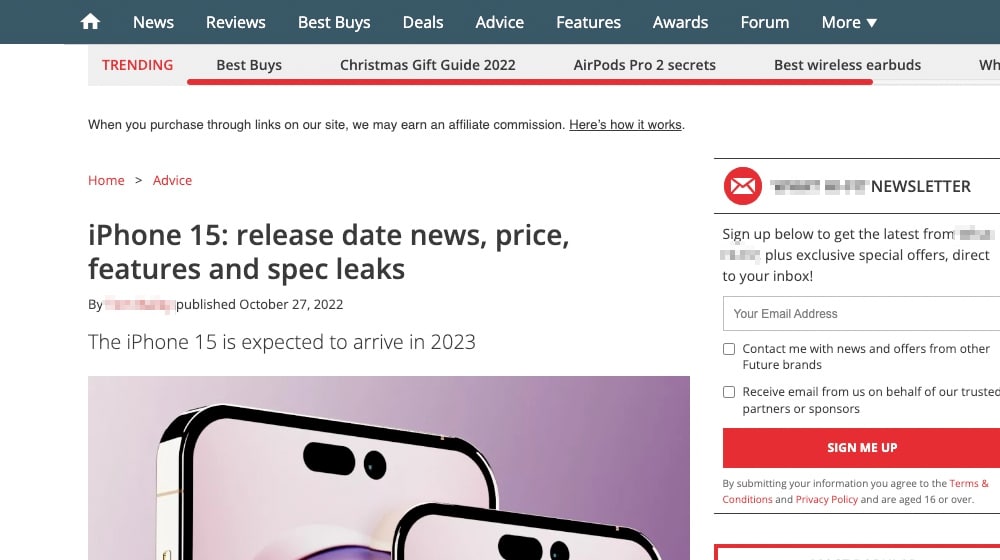
This technique is all over the place because the sites mine for common questions and create placeholders they fill out later, even if "later" means months down the line.
It's also called out in Google's Search Rater Guidelines as something to devalue, and more recently, in Google's 2022 Helpful Content Update.
2: Untargeted "Outreach"
Outreach is a fantastic way to build a network, gather more connections in your industry, guest post, gain links, and generally become part of a collaborative community.
Unfortunately, many tools are available that build massive lists of niche blog owners and generate "outreach" to those bloggers, generally using personalized-looking templates. Rather than picking one or two high-quality targets to talk to, site owners hit a button and see who on their list of thousands responds to their unsolicited emails. There are even services that will do all of the work for you.
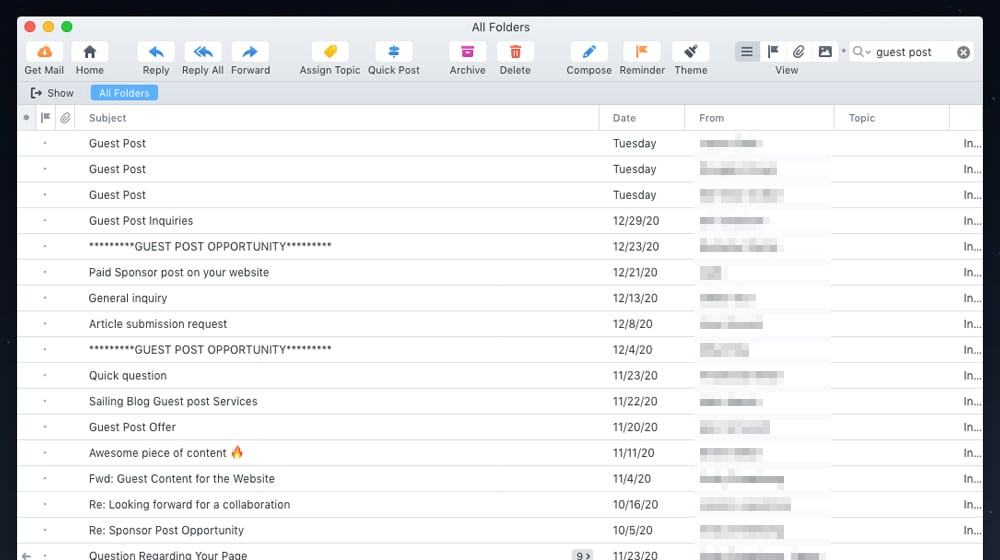
This strategy is unethical because it's just one step away from spam, and may even violate the CAN-SPAM act. Besides, website owners have enough to deal with in their inboxes without many no-name bloggers sending backlink-fishing requests at all hours of the day.
I wrote an article on this phenomenon here and why it happens:
3: Link Manipulation
Backlinks, and links in general, are one of the primary keys to all of Google. Nearly every one of their hundreds of search ranking metrics is used to modify and adjust for the core rank of a site generated by its backlink profile.
For as long as Google has existed, people have used various link structures to promote themselves. These have ranged from highly straightforward to hideously complex, with link wheels, link exchanges, PageRank sculpting, and many more examples throughout the past 30 years.
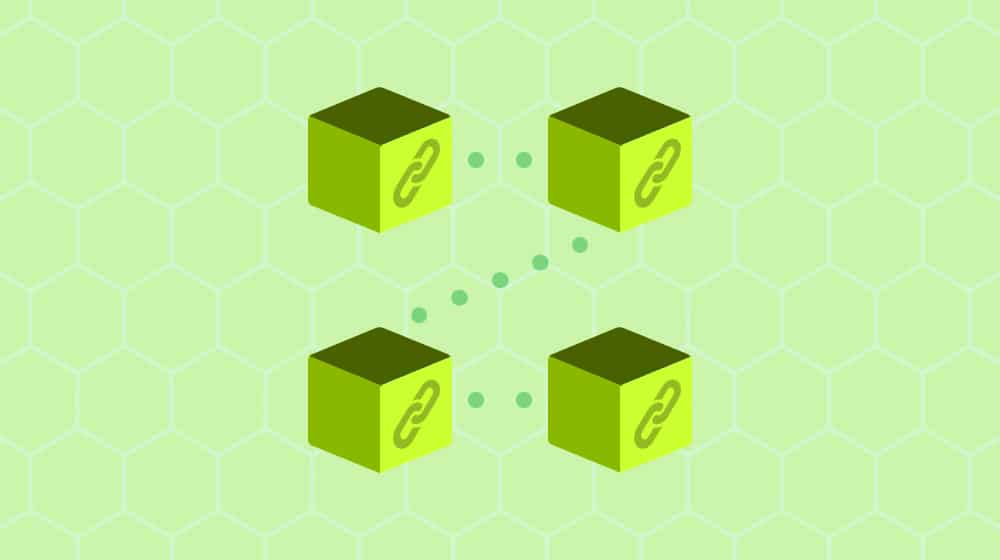
There are still – and always will be – ways to generate and manipulate links in ways that look natural to a casual observer but aren't. Google is working hard to detect these algorithmically, and sooner or later, it'll catch up to you.
4: Expired Site Cloning
This strategy is an unethical SEO technique that strays close to breaking the law. The idea is to watch for when a website in your niche dies, and the domain goes down. The site is dead, and it's probably not coming back. But that site had good backlinks on it that are now broken links.
The old version of this technique was to buy the domain, scrape the URL structure from when it was last active, and redirect all of those pages to your site, effectively siphoning off the link juice. Google eventually started putting websites that expire into a sandbox to prevent this from working, but crafty marketers developed a new technique.
What you do now is use a tool like the Wayback Machine internet archive to find the content on that site that was getting linked to and copy it. If you do a straight 1:1 copy, it's a violation of copyright (yes, even if the original site is down, the site owner owns that copyright regardless). Still, most people using this technique spin or rewrite the content.
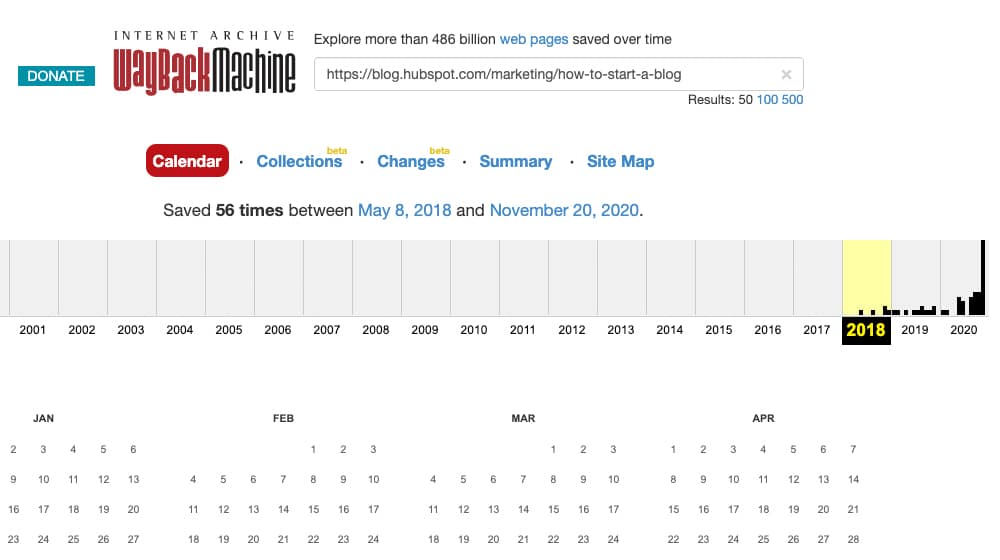
Alternatively, marketers will find sites that are linked to the now-dead site. You locate the links on their pages and send a contact message to the site owner. "Hey, I noticed link X on page Y is dead; I have a similar piece of content available if you would like to replace it with a working link."
This strategy is called broken link building, and it's perfectly acceptable. You're alerting the webmaster about broken pages and providing them with a working replacement; everybody wins.
5: Private Blog Networks
PBNs are one of those strategies that are exceptionally contentious amongst webmasters. Some love them, swear by them, claim they still work and will work forever, and are huge proponents of them. Some hate them, say they're a surefire route to a search penalty, and will never use them. The first group, coincidentally, often runs and sells links from their PBNs, if that tells you anything.
A PBN is what happens when you, as a blogger, create multiple sites, anywhere from 2-3 up to hundreds or even thousands. That group of sites is owned and controlled by a single person or company; hence, it's now a private blog network (PBN). There's nothing wrong with owning a lot of websites; it causes problems if you hide your identity and ownership of those sites and break the Google Search Essentials (formerly called the Google Webmaster Guidelines).
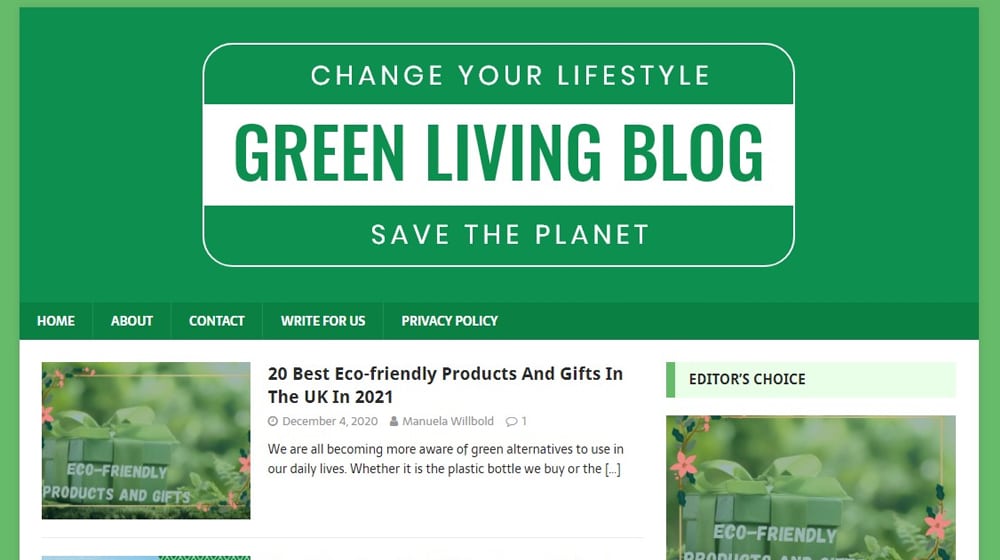
If you have those sites linking to each other and to your primary sites, you're now running into problems. Google has been publicly targeting private blog networks as early as 2014, and as PBNs get more sophisticated and stealthy, Google gets better at detecting them.
The issue here is that backlinks are meant to be votes of quality from one site to another. When you're the owner of both websites, you're just voting for yourself. The vote isn't meaningful if it's from yourself, but you're presenting your websites as individual and unrelated entities.
It isn't worth the risk.
6: Spinning Content
Content spinning happens when you use a piece of software to create variations on a single piece of content and present each version (either on your site or across different websites) as unique.
For example, I could write the same paragraph:
"Article spinning happens when a blogger uses an app to make different versions of one piece of content and posts each version (on their site or several sites) as unique."
This kind of variation on the same topic is acceptable if it's different writers on different sites, but when it's one person behind all of it, it just looks like spam. Of course, the added problem is that the "seed" content for a spun library is often stolen in the first place.
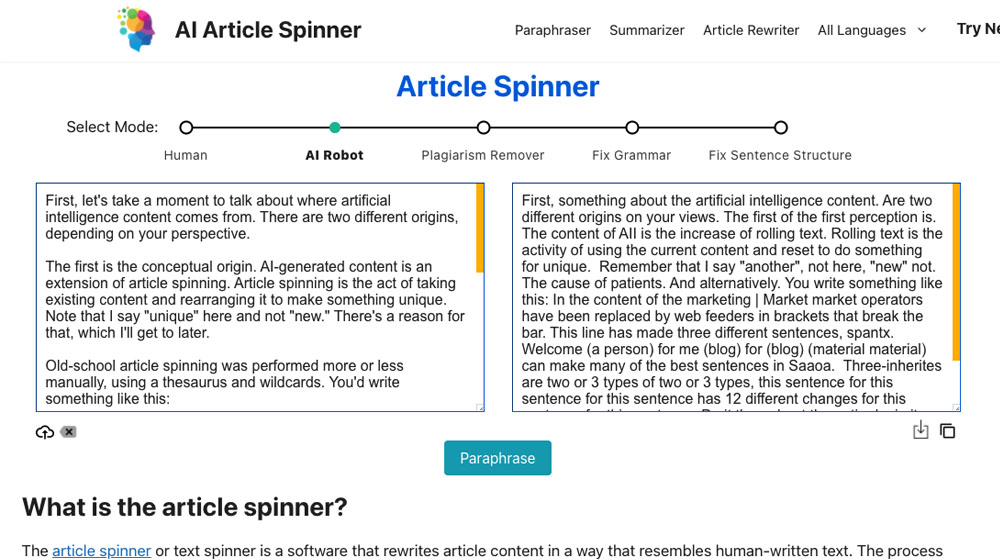
Of course, you're not fooling search engines, either. Spun content is easily detected, and it's treated the same as plagiarism.
See also: AI content. AI content is generated based on training data, and that training data is almost always stolen content. AI content generators are often trained on offline data and journals to make it harder to detect, but Google is always one step ahead.
7: Directories
Back in the day, if you wanted to follow a dozen different websites, you would have to visit each of them in turn, use an RSS reader, or some other form of notification like an email newsletter.
To find the content you might want to follow, enterprising entrepreneurs created directory pages to make it easier. Users could browse the directory for everything they wish to see on the topic. These directories would re-host and re-post content from sites submitting it, usually with a link back to the source.
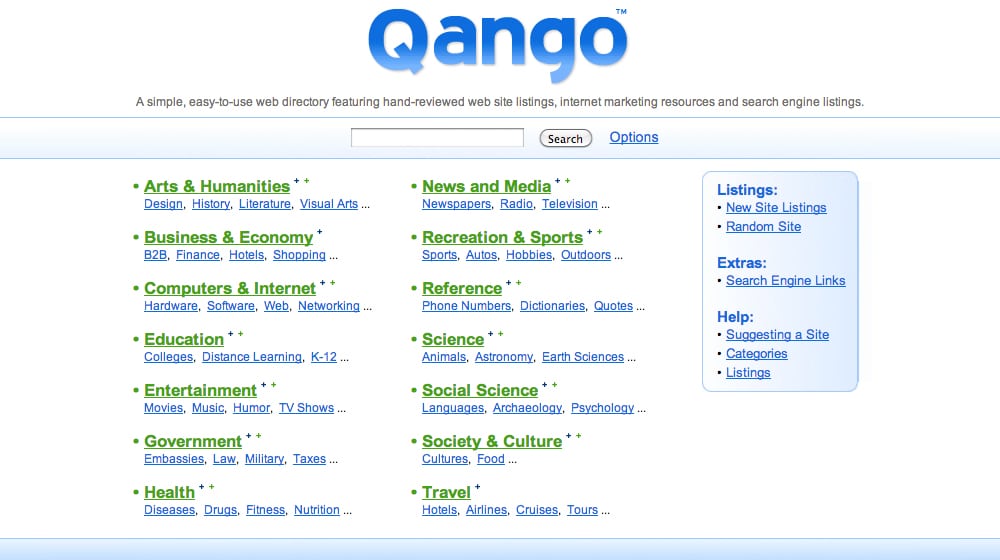
In reality, these directories were quickly taken over by website owners who wanted to abuse them for their backlinks. Today, directories have been stratified, and only a few are still worth using, usually because of heavy curation. Google considers most of these links low-quality link spam that violates the Google Search Essentials / Webmaster Guidelines, along with every other form of user-generated links like links in blog comments or forum posts.
Besides, RSS still exists, and if someone wants to see content from a bunch of sites all in one place, they'll use social media networks like Facebook.
8: Paid Reviews and Recommendations
Paying for promotion is nothing new, and it's not bad. PPC ads are everywhere, sponsored content is standard, and affiliate marketing is based on the whole concept.
If you pay for someone to recommend your product to potential customers, and they disclose that the post is sponsored, that's fine. It gives users the information they need to form their own opinion.
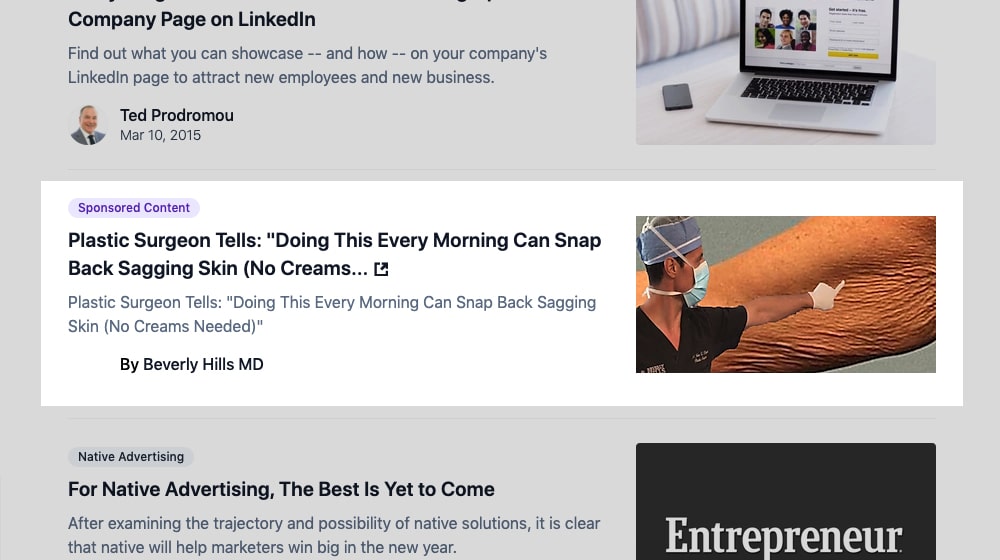
On the other hand, if an influencer promotes products regularly and has a single line in their bio about how "some links are sponsored content," they're obfuscating what links are paid for and which aren't. That denies the information to users, who might think a paid and promoted link is organic. Otherwise, this is false advertising, and you will be running afoul of the federal trade commission.
This marketing tactic is unethical behavior, and it's often in violation of FTC rules. If it were always clear-cut, then it'd be a firmly illegal technique. It's tricky sometimes, though, which is why it's on this list in the first place.
9: Keyword Over-Optimization
Keyword stuffing has been around for decades since keywords are as important as links for SEO. Years and years ago, it was a simple "keyword used more equals content better" algorithm, so it was easy to slam a keyword into a piece of content ten times in 500 words and rank #1. Google got more and more sophisticated and now penalizes keyword stuffing.
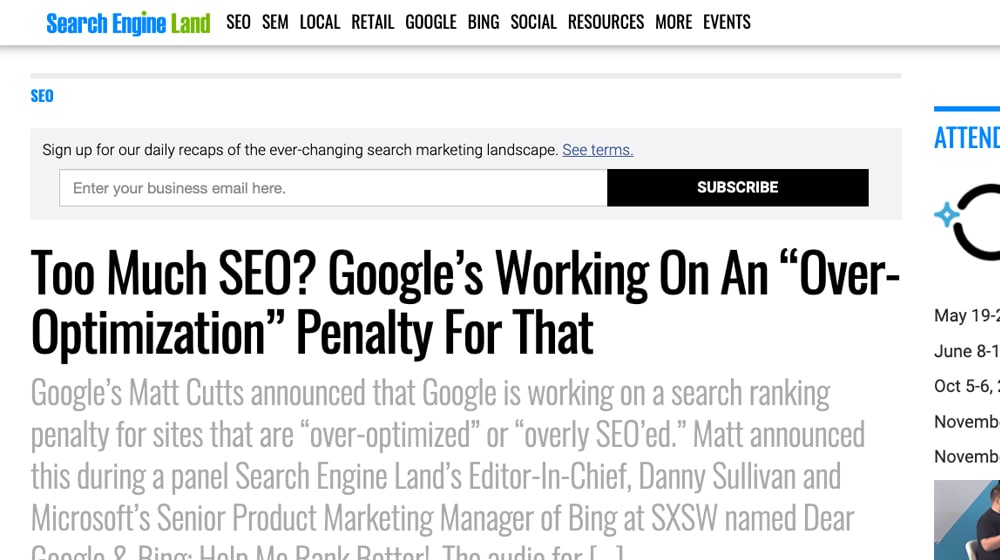
That doesn't mean it doesn't happen. It just means it's more subtle. People toe the line and find how frequently they can use a given keyword and related keywords to be as optimal as possible. They even use AI tools to help with this analysis.
Google may change its standards, but it's equally likely that the tools will adapt. There's even some discussion that tools like Clearscope are crossing the line. It's a sticky situation with no obvious answer.
Shifting Rules
One of the most complex parts of digital marketing is keeping up with the ever-shifting landscape of laws, regulations, and rules from various authorities that can influence the space. Techniques you (and everyone else) thought were fine might have been acceptable at the time but have since been made into unethical marketing practices.
Of course, sometimes marketing ethics are obvious. Tinting your font color to match your background color and writing a bunch of keywords used to work, but it was always obviously an exploit in the systems used to rank content. Other times, it's all about shifting standards, needs, and rules. There's a lot to track when you have the government, various organizations, and companies like Google capable of making the rules you have to play by.
What's your favorite unethical technique that no longer works? Was there something clever you just loved thinking about, or one you used to significant effect and are sad it's no longer effective? Tell me your story; I'd love to hear it.










Comments